

Vint Cerf. American computer scientist Vinton Gray Cerf[2] ForMemRS[1] (; born June 23, 1943) is an American Internet pioneer and is recognized as one of "the fathers of the Internet", sharing this title with TCP/IP co-developer Bob Kahn.[7][8][9][10] He has received honorary degrees and awards that include the National Medal of Technology,[2] the Turing Award,[11] the Presidential Medal of Freedom,[12] the Marconi Prize and membership in the National Academy of Engineering.
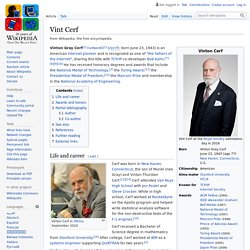
Life and career[edit] Vinton Cerf in Vilnius, September 2010 Cerf was born in New Haven, Connecticut, the son of Muriel (née Gray) and Vinton Thurston Cerf.[13][14] Cerf attended Van Nuys High School with Jon Postel and Steve Crocker. While in high school, Cerf worked at Rocketdyne on the Apollo program and helped write statistical analysis software for the non-destructive tests of the F-1 engines.[15] Cerf is active in a number of global humanitarian organizations. On February 7, 2006, Cerf testified before the U.S. Peter Sunde Kolmisoppi at NextM Stockholm 2019. Last Week Tonight with John Oliver: Government Surveillance (HBO) Safe and Sorry – Terrorism & Mass Surveillance. Public, privé, politique : Internet au 21ème siècle - Benjamin Bayart.
Big Brother habite Place Beauvau ? Exégèse en libertés [EN DIRECT] 21 06 2013 12:55:16. ♫ Rien à cacher - Jérémie Zimmermann et la Parisienne Libérée ♫ Rien à cacher ? 20 minutes pour comprendre. Rien à cacher (argument) Un article de Wikipédia, l'encyclopédie libre. « Rien à cacher » — ou, formulé de façon plus complète, « si vous n’avez rien à cacher, vous n’avez rien à craindre » — est un argument mis en avant pour soutenir que les analyses des données et les programmes de surveillance des gouvernements ne sont pas un problème pour la vie privée, dans la mesure où cette vie privée ne couvre pas d’activités illégales[1].
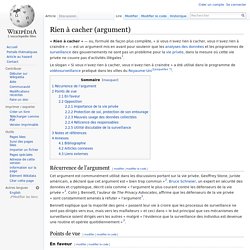
Le slogan « Si vous n’avez rien à cacher, vous n’avez rien à craindre » a été utilisé dans le programme de vidéosurveillance pratiqué dans les villes du Royaume-Uni[Lesquelles ?]. Cet argument est communément utilisé dans les discussions portant sur la vie privée. Geoffrey Stone, juriste américain, a déclaré que cet argument est « bien trop commun »[2]. Edward Snowden: Here's how we take back the Internet. Glenn Greenwald: Why privacy matters. What Does Google Know About Me? Did you know that unlike searching on DuckDuckGo, when you search on Google, they keep your search history forever?
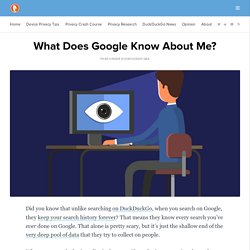
That means they know every search you’ve ever done on Google. That alone is pretty scary, but it’s just the shallow end of the very deep pool of data that they try to collect on people. What most people don’t realize is that even if you don’t use any Google products directly, they’re still trying to track as much as they can about you. Google trackers have been found on 75% of the top million websites. This means they're also trying to track most everywhere you go on the internet, trying to slurp up your browsing history! Most people also don’t know that Google runs most of the ads you see across the internet and in apps – you know those ones that follow you around everywhere? But even that’s not all… Three Reasons Why the "Nothing to Hide" Argument is Flawed. Over the years, we at DuckDuckGo have often heard a flawed counter-argument to online privacy: “Why should I care?
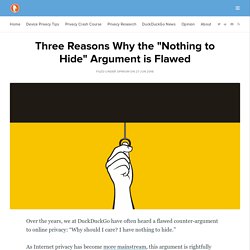
I have nothing to hide.” As Internet privacy has become more mainstream, this argument is rightfully fading away. However, it’s still floating around and so we wanted to take a moment to explain three key reasons why it's flawed. 1) Privacy isn’t about hiding information; privacy is about protecting information, and surely you have information that you’d like to protect. Do you close the door when you go to the bathroom? Simply put, everyone wants to keep certain things private and you can easily illustrate that by asking people to let you make all their emails, texts, searches, financial information, medical information, etc. public. 2) Privacy is a fundamental right and you don't need to prove the necessity of fundamental rights to anyone.
The Doors Of Perception. Cognitive liberty. Freedom of an individual to control their own mental processes Cognitive liberty, or the "right to mental self-determination", is the freedom of an individual to control their own mental processes, cognition, and consciousness.
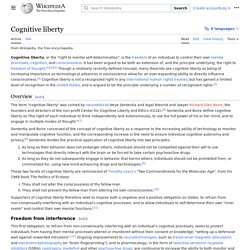
It has been argued to be both an extension of, and the principle underlying, the right to freedom of thought.[1][2][3] Though a relatively recently defined concept, many theorists see cognitive liberty as being of increasing importance as technological advances in neuroscience allow for an ever-expanding ability to directly influence consciousness.[4] Cognitive liberty is not a recognized right in any international human rights treaties, but has gained a limited level of recognition in the United States, and is argued to be the principle underlying a number of recognized rights.[5]
Freedom. Liberty, in philosophy, involves free will as contrasted with determinism.[1] In politics, liberty consists of the social and political freedoms to which all community members are entitled.[2] In theology, liberty is freedom from the effects of, "sin, spiritual servitude, [or] worldly ties.
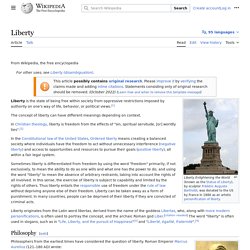
"[3] Generally, liberty is distinctly differentiated from freedom in that freedom is primarily, if not exclusively, the ability to do as one wills and what one has the power to do; whereas liberty concerns the absence of arbitrary restraints and takes into account the rights of all involved. As such, the exercise of liberty is subject to capability and limited by the rights of others.[4] Liberty.
Liberté. Pour le sens commun, la liberté s'applique principalement aux individus et s'oppose à la notion d'enfermement ou de séquestration.
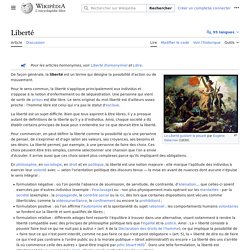
Une personne qui vient de sortir de prison est dite libre. Chaos theory. A double rod pendulum animation showing chaotic behavior.
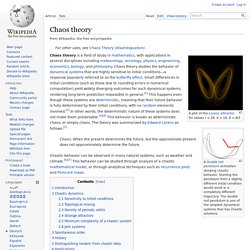
Starting the pendulum from a slightly different initial condition would result in a completely different trajectory. The double rod pendulum is one of the simplest dynamical systems that has chaotic solutions. Chaos: When the present determines the future, but the approximate present does not approximately determine the future. GS 122 0023. L'ABSENCE DE L'INTIMITE, JEUDY HENRI-PIERRE, LaProcure.com. Ajouter un avis sur cet ouvrage : Informations légales Les avis de cette rubrique sont la propriété de La Procure.
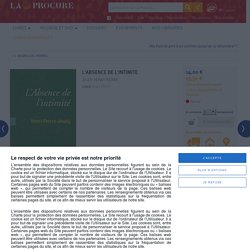
Les auteurs s'engagent donc à renoncer à tous leurs droits de propriété. L'internaute a le droit de publier un avis par livre, mais certains livres ne sont pas ouverts aux avis. Les données obligatoires sont nécessaires pour que vous puissiez faire paraître votre commentaire. Vous disposez d'un droit d'accès, de rectification, de modification et de suppression des données qui vous concernent. La rédaction des critiques sur laprocure.com est soumise à une charte : Nous nous réservons le droit de ne pas publier les commentaires ne respectant pas la charte de rédaction. Ce module vise uniquement à collecter des commentaires sur le contenu d'une oeuvre. Repenser le concept d’intimité.
"Intimité" par Henri-Pierre Jeudy du 17 novembre 2012. « Exhiber sa vie privée dans l’espace public prédispose à laisser les gens pénétrer chez soi » DIFA 011 0011. Inside Out Movie Trailer. Full HD Trailer #1. La privation de l'intime : mises en scène politiques des sentiments - France Culture. Nothing to Hide (Italian, Japanese, Portuguese, Spanish and English cc) Colloque 2017 // Parole publique, parole privée. Le corps / Le regard / L'intimité. SNOWDEN - Official Trailer. Citizenfour Official Trailer 1 (2014) - Edward Snowden Documentary HD.